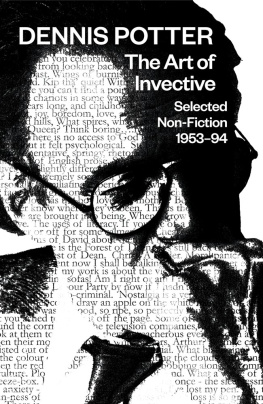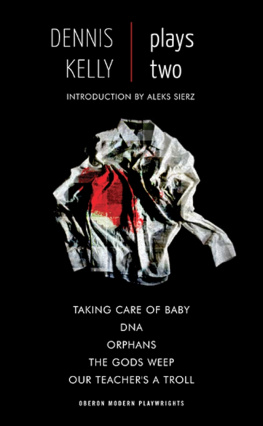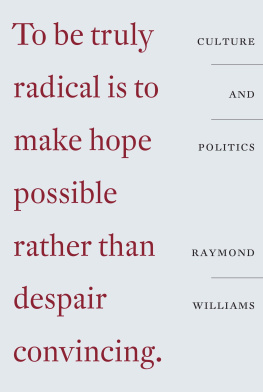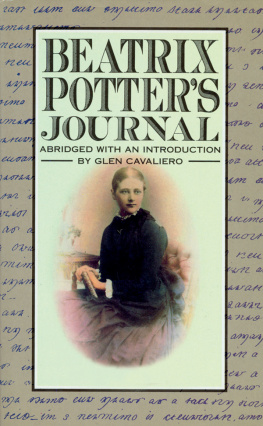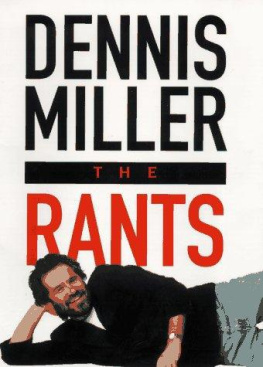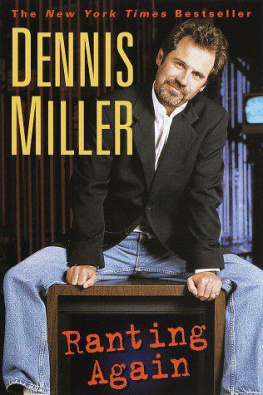The Art of Invective
Selected Non-Fiction
195394
The Art of Invective
Selected Non-Fiction
195394

Dennis Potter
edited by
Ian Greaves
David Rolinson
John Williams

First published in paperback in 2015 by Oberon Books Ltd
521 Caledonian Road, London N7 9RH
Tel: +44 (0) 20 7607 3637 / Fax: +44 (0) 20 7607 3629
e-mail:
www.oberonbooks.com
Collection Ian Greaves, David Rolinson and John Williams
By arrangement with PFH (Overseas) Limited c/o Judy Daish Associates Limited, 2 St Charles Place, London W10 6EG. All rights reserved.
Dennis Potter is hereby identified as author of the individual items in this work in accordance with section 77 of the Copyright, Designs and Patents Act 1988. The author has asserted his moral rights.
Ian Greaves, David Rolinson and John Williams are hereby identified as editors of this work in accordance with section 77 of the Copyright, Designs and Patents Act 1988. The editors have asserted their moral rights.
Foreword Peter Bowker
Excerpts from The Daily Herald reprinted by permission of Mirrorpix. All rights reserved.
Entitled to Know and School Sketch reprinted by permission of John Nathan. All rights reserved.
BBC copyright material reproduced courtesy of the British Broadcasting Corporation. All rights reserved.
The publisher has made every effort to trace the copyright holders of all material reprinted in this book. Acknowledgement is made in all cases where the extract source is available, but we would be grateful for information about any extracts where sources could not be traced.
You may not copy, store, distribute, transmit, reproduce or otherwise make available this publication (or any part of it) in any form, or binding or by any means (print, electronic, digital, optical, mechanical, photocopying, recording or otherwise), without the prior written permission of the publisher.
Any person who does any unauthorized act in relation to this publication
may be liable to criminal prosecution and civil claims for damages.
A catalogue record for this book is available from the British Library.
PB ISBN: 978-1-78319-203-8
EPUB ISBN: 978-1-78319-702-6
Printed and bound by Replika Press PVT Ltd, India.
eBook conversion by CPI Group.
Visit www.oberonbooks.com to read more about all our books and to buy them. You will also find features, author interviews and news of any author events, and you can sign up for e-newsletters so that youre always first to hear about our new releases.
CONTENTS

Dennis Potter and Me
A foreword by Peter Bowker
L ike many a 1970s hysteric, I can lay claim to having been titillated by the work of Dennis Potter long before I had actually seen any of it. Our family didnt get BBC2 till the mid-Seventies so, for some time, my only acquaintance with his work was the BBC1 announcer intoning, And now over on BBC2, Casanova for six weeks. In fairness, that was probably all the TV filth a 13-year-old in 1970s Stockport could handle without imploding.
But the real beginning the real meeting with his work was the moment in Pennies from Heaven when Bob Hoskins Arthur first turned to camera and opened his mouth and Elsie Carlisles voice came out. I can remember sitting there and thinking, Are they allowed to do that? It was so audacious but yet it made perfect sense. It was experimental but it was impossible to imagine the story being told in a better way. And like all great ideas, you were left wondering why nobody had thought to do it before.
As the years went by and I took in Blue Remembered Hills, The Singing Detective and Cream in My Coffee, I used to fantasize that me and Dennis Potter could be mates. Reading this collection does make me think that he would have been a tough mate to have.
The cruel and witheringly precise humour that we see Philip Marlow exercise in The Singing Detective is very much present in both his views on television and his views on himself. Reading this collection it is clear that critically, he didnt appear to have a safety catch. He seemed not to recognize that simultaneously being a practising dramatist and a drama critic was problematic in any way, or, being Potter, relished the fact.
Just as his best drama simultaneously provided a critical and often musical analysis of the drama as it unfolded, so his non-fiction often reads as a dramatic monologue disguised as analysis. The musical rhythm of his dialogue and the savage put downs are all present and correct in his prose style.
Here he is reviewing a 1972 adaptation of War and Peace and taking on his familiar anti-realist position. Noting how much the director lingers on the soup plates, he goes on, Naturalism might well demand that life be turned into one damned dish after another, but the insights of a great novelist are rather more interesting than the eye-line of the head waiter.
And here again, in a review of Till Death Us Do Part in which he worries that the character Alf Garnett has become a hero to the very racists he was invented to parody. He opens with an anecdote about a recent stay in hospital in which he found himself sharing a ward with
assembled Alfs addressing themselves to the unpalatable fact subdued Pakistanis had somehow managed to infiltrate into the ward under the pretence of chronic sickness. We all knew as a matter of course that these cunning brown bastards were only there to draw social security payments, an argument which temporarily wavered when one of them so miscalculated his ruse that he actually went so far as to die. Theres yer bleedn curry for you, observed my nearest Alf, not entirely without compassion.
As a piece of satire, I cant think of a finer or wittier skewering of the myth of health tourism and benefits cheats in the space of one paragraph.
As a piece of prose it has elegance and playfulness, that final not entirely without compassion reading almost like a stage direction and, like a perfectly weighted pass, allowing the reader to take it in their stride.
Most rewarding of all for the Potter geek, it is recognisably the blueprint for a moment in The Singing Detective where Ali the Pakistani in the next bed to Philip Marlow turns the expectation of racist abuse into a moment of shared hilarity between Marlow and himself at the expense of a liberal young houseman.
With his eye for absurdity and precision of language, how I would have loved to have read Dennis Potter on the likes of Iain Duncan Smith or Nigel Farage. Indeed, Farage, with his strained combination of fake bonhomie and victimized suburban bluster, could almost be a character invented by Potter and played by Denholm Elliott. Cameron, you suspect, would be too easy a target, although I would like to see what he would have made of Nick Cleggs avowed love of Samuel Beckett.
Theres a tone in Potters prose and in his voice in interviews that reflects the masochism at the heart of his greatest work. He endlessly tortures himself with the notion that TV isnt worthy of the same intellectual interrogation as literature or art but then makes it clear that he intends to ignore his misgivings and give the same forensic attention to an episode of Steptoe and Son or Coronation Street as he would, indeed does to War and Peace.
Naturalism, as Dennis was keen to remind us throughout his career, was just one way (and a flawed way at that) of writing television drama, but it had, partly through soaps and long running series like
Next page
